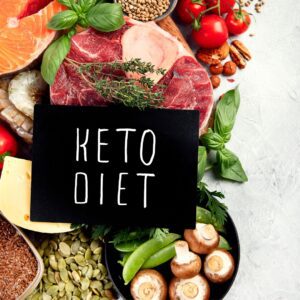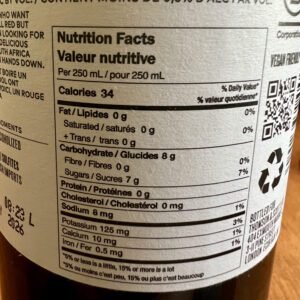Non Alcoholic Wine, Keto & Weight Loss: Guilt-Free Sips

I’m passionate about non alcoholic Wine & Keto. How about you? Picture this: you’re sitting down at the table for dinner. You have in front of you Keto Parmesan Crusted Chicken Wings. What are you drinking with your meal? Water, either flat or sparkling? Herbal tea or black coffee? Lemon water? Infused water?
When following a Keto diet or low-carb lifestyle, there’s only so many options for beverage from which to choose. How about a chilled glass of Chardonnay, singing with zesty acidity to clean the palate? You sip the wine. You take a bite of your Keto Parmesan Crusted Chicken Wings. Magical! The wine’s singing acidity tastes delightful against the saltiness in the Parmigiano cheese coating on the chicken. Perfection!
If you’re on the Keto diet, incorporating non alcoholic wine with zero sugar into your diet is worth exploring.
Non alcoholic wine with zero sugar is not just a beverage; it’s a game-changer. Think improved health markers, like lower blood sugar levels, and reduced inflammation. And let’s not forget about hydration. Swap out those drinks filled with artificial sweeteners and preservatives for a refreshing glass of non-alc wine with zero-carbs and zero-sugar. A glass of non alcoholic wine with no sugar keeps your hydration game strong while adding a touch of sophistication to your routine and lifestyle.
Sipping non alcoholic wine with zero sugar is not just about the health benefits; it’s also about the experience. Pairing the ideal wine with your keto dish can elevate your sensory journey, slowing down your mind and allowing you to savor each moment. Pairing any wine with food reduces stress thereby enhancing the quality your life.
What Are The Top 10 Key Takeaways From This Blog?
Here are the top 10 key takeaways from the blog:
- Understanding Ketosis: To achieve ketosis, it’s essential to significantly reduce carbohydrate intake to around 20-50 grams per day. Excess sugar can disrupt ketosis by raising insulin levels, hindering the body’s ability to produce ketones for energy.
- Zero-Sugar Options: There are alcohol-free wines available with zero or significantly reduced sugar content for those on a ketogenic diet.
- Impact of Residual Sugars: The carbohydrate and calorie content in non-alcoholic wine primarily comes from residual sugars left after fermentation, as well as any additional ingredients used in the production process.
- Carbohydrate Content: The carbohydrate content in non-alcoholic wine varies depending on factors such as brand, grape variety, and production methods, with some varieties containing up to 15 grams of carbohydrates per 6-ounce glass. If you’re aiming for ketosis or you are already in the state of ketosis, refrain from non alcoholic wines that have any carbs or sugars.
- Sugar Calculation: Reading the nutritional label on wine bottles is crucial for understanding the sugar and carbohydrate content per serving size, allowing you to make informed choices about your intake.
- Impact on Blood Sugar Levels: Non-alcoholic wines high in sugar can lead to rapid spikes in blood sugar levels, potentially causing energy crashes and promoting fat storage if not used for energy.
- Health Benefits: Moderate consumption of low-carb non-alcoholic wine has been linked to improved heart health, hydration, and antioxidant benefits from grape-derived nutrients.
- Potential Side Effects: While low-sugar non-alcoholic wine can be suitable for low-carb diets, it’s essential to consider potential side effects such as gastrointestinal discomfort and increased calorie intake.
- Selecting Compatible Wines: When choosing non-alcoholic wines for a low-carb or ketogenic diet, prioritize options with minimal sugar content, labeled as “zero sugar” or “low carb,” to align with dietary goals.
Can Zero-Carb Non Alcoholic Wine Kick You Out of Ketosis?

While non-alcoholic wines labeled as “zero-sugar” may seem keto-friendly, it’s important to consider their total carbohydrate content, not just the sugar level. Some of these wines may still contain residual carbs leftover from the winemaking process that could potentially disrupt ketosis if consumed in excess.
However, there are some non-alcoholic wines on the market that utilize specialized fermentation techniques to remove virtually all sugars and minimize carbohydrates to near-zero levels. For these truly zero-sugar, zero-carb non-alcoholic wines, having a glass or two in moderation is unlikely to completely kick someone out of ketosis, as long as it fits within their total daily carb allotment on a ketogenic diet.
But higher-carb non-alcoholic wines, even those labeled “low-sugar,” could interfere with maintaining ketosis by providing enough glucose for the body to burn as fuel instead of fat and ketones. So for strict keto dieters, it’s crucial to check the full nutritional labels and opt for non-alcoholic wines that are as low as possible in both sugars and total carbohydrates.
When aiming to reach ketosis, the goal is to significantly reduce carbohydrate intake, typically to around 20-50 grams per day, depending on your individual factors like weight, weight to lose, age, activity level, and metabolism.
ONES non-alcoholic sparkling wines with zero carbs and zero sugar will not kick you out of ketosis!
(Click this link for a 10% discount on ALL Ones Sparkling Wines)
Where Do Calories And Carbs Come From In Non Alcoholic Wine?

How Many Carbs Are in Non Alcoholic Wine?

The carbohydrate content in zero alcohol wine varies depending on factors such as brand, grape variety, production methods, sugars, glycerine (carbohydrates). On average, a 6-ounce glass of non alc wine can contain anywhere from zero to around 15 grams of sugar, with some varieties containing even more.
The label may say the wine has zero sugar but have some or a significant amount of carbohydrates. The carbohydrates can come from the glycerine in the wine.
Glycerine in Non Alcoholic Wine:
Glycerine, also known as glycerol, can naturally occur in wine through several processes. During fermentation, yeast cells metabolize sugars in the grape juice, producing alcohol (ethanol) as well as glycerol as a byproduct. Glycerol can also be added to wine during the winemaking process as a fining agent or as part of the wine’s formulation to enhance its texture and mouthfeel.
Glycerine contributes to the character of wine in several ways:
- Body and Mouthfeel: Glycerol adds viscosity and “body” to the wine, imparting a smooth and rounded mouthfeel. Wines with higher levels of glycerol may feel fuller-bodied and more luxurious on the palate.
- Sweetness Perception: While glycerol itself is not sweet, it can enhance the perception of sweetness in wine. This is because glycerol interacts with the taste buds and can mask bitterness, making the wine seem smoother and more balanced.
- Aging Potential: Glycerol can act as a stabilizing agent in wine, helping to preserve its freshness and structure over time. Wines with higher levels of glycerol may age more gracefully and develop complex flavors with bottle aging.
Regarding its classification on nutritional labels, glycerol is indeed considered a sugar alcohol. Sugar alcohols are a type of carbohydrate that are structurally similar to both sugars and alcohols but are metabolized differently in the body. Glycerol contains calories, like other carbohydrates, but it has a lower impact on blood sugar levels compared to traditional sugars. Therefore, on nutritional labels, glycerol is often listed under the total carbohydrate count, and its calories may be accounted for in the total caloric content of the wine. It’s worth noting that while glycerol contributes to the carbohydrate count on nutritional labels, it does not have the same effect on blood sugar levels as other carbohydrates, such as glucose or sucrose.
Glycerine and Ketosis:
Glycerine in wine, when listed as a carbohydrate on nutritional labels, can potentially affect ketosis depending on its quantity and how it is metabolized by the body.
While glycerol is technically considered a carbohydrate and may be listed as such on nutritional labels, it has a different metabolic pathway compared to traditional sugars like glucose or fructose. Glycerol can be converted into glucose by the liver through a process called gluconeogenesis. This means that consuming glycerine could potentially contribute to an increase in blood glucose levels, which could impact ketosis, as maintaining low blood glucose levels is a key aspect of achieving and sustaining ketosis.
However, the impact of glycerine on ketosis is likely to be minimal for several reasons:
- Quantity: The amount of glycerine present in wine is typically small, and its contribution to overall carbohydrate intake is relatively low. Most wines contain only trace amounts of glycerine, so the impact on blood glucose levels is likely to be minor.
- Metabolic Differences: While glycerol can be converted into glucose, the rate of conversion is slower compared to the metabolism of traditional sugars. This means that glycerol is less likely to cause a rapid increase in blood glucose levels that could disrupt ketosis.
- Individual Variability: The impact of glycerine on ketosis may vary from person to person depending on factors such as metabolic rate, insulin sensitivity, and overall carbohydrate intake. Some individuals may be more sensitive to glycerine’s effects on blood glucose levels than others.
Overall, while glycerine in wine may technically be classified as a carbohydrate and could potentially affect ketosis, its impact is likely to be minimal for most people when consumed in moderation as part of a low-carbohydrate diet. As always, individual responses may vary, so it’s important for those following a ketogenic diet to monitor their blood ketone levels and adjust their intake accordingly.
Suggestion:
My suggestion is that you include non alcoholic wines with zero sugar but with carbs (most likely from glycerine) in your low carb lifestyle. If you’re moving toward ketosis or you are in a state of ketosis, I would not chance it. Stick to non alcoholic wines that have zero alcohol and zero carbs.
Again, be sure to read the nutritional label on the back of the wine bottle. Some nutritional labels are straight forward, letting you know that you’ll basically get 1 gram of sugar for every ounce of wine. It’s easy to calculate.
I’ve also found labels that are not so straight forward. The nutritional label will say the “values” are based on 100 mL, but the serving size is 150 mL. In this case, you’ll have to do a bit of mathematical calculating to figure out the grams of sugar per ounce. Personally, I hunt for wines with 1.5 grams of sugar or less per ounce. This way you keep the total carbs/sugars per glass under 9 grams per 6 ounce glass. Be sure to include the sugar as carbs in your carb count for the day.
I get excited when I can find quality non-alcoholic wines with zero sugar or 2 to 3 grams per 6 ounce glass.
Is Zero Carb, Zero Sugar Non Alcoholic Wine Possible?

Some non alc wines on the market have zero sugar and zero carbs and are advertised this way. These wines represent a small portion of the non alcoholic wines industry. Not all wine shops and restaurants carry these products, especially in small cities or towns. You may have to order them online.
USA:
In the USA, the wines from Pure The Winery are stated to contain 0 grams of carbohydrates and 0 grams of sugar. Pure The Winery is a collaboration between international wine enthusiasts and a traditional winery in Piedmont, Italy with the vision of creating sugar-free wines. Their unique fermentation process allegedly converts all the grape sugars into alcohol, resulting in wines that contain 10.5% ABV but claim to have 0 grams of carbohydrates and 0 grams of sugar.
They offer red, white, rosé, and sparkling wine varieties marketed as having the same delicious taste as traditional wines but with at least 30% fewer calories compared to wines with 12% ABV or higher that contain sugars. Pure The Winery touts their “uncomplicated” zero-sugar, zero-carb wines as an award-winning option for those looking to enjoy wine responsibly while taking care of their health. The wines are vegan, all-natural, and produced in Italy’s Piedmont region.
Canada:
ONES COLLECTIONS (ZERO ALCOHOL, ZERO SUGAR)
In Canada, there’s a west coast company called ONES that produces zero carb and zero sugar non alc wine. I’m a big fan of their bubblies. The bubblies are light and refreshing, allowing me to enjoy as much as I like without fretting over carb intake. These wines offer a pleasant change from other beverages I pair with my low-carb meals. Having a glass of bubbly is healthy, refreshing, and a treat.
Two west coast boys started ONES. Provinces apart, Chris and Tyler grew up on family farms. Chris’ background led him to work in cherry and apple breeding in Summerland, while Tyler found his way back to the land through winemaking in the Okanagan. Over the years (and glasses of wine) they realized there was a hole in the market for the non-drinker who was interested in a proper bottle of non-alcoholic wine. They landed on ONES, a 0.5% wine made with BC Grapes with no added sugars or chemicals. They are proud to be making the Okanagan’s only non-alcoholic wine.
I’ve personally tried all 3 of their products and adore them. After a workout, I enjoy a glass of bubbly. Plus, I pair ONES with various dishes. On my carb day, I relish a glass alongside air-popped plain popcorn. While I liked all three, I particularly love the Sparkling Rose.
(Click this link for a 10% discount on ALL Ones Sparkling Wines)
How Do Non Alcoholic Wines Impact Blood Sugar Levels?

When you drink a beverage high in sugar, like a non alcoholic wine with significant sugar content, your blood sugar levels quickly spike. Your pancreas releases insulin to help cells absorb the glucose, causing a surge in energy. However, this boost is short-lived, and you may experience a subsequent crash in energy levels.
Excess glucose not used for energy gets stored as fat, potentially leading to weight gain. Additionally, consuming sugary non alcoholic wine can disrupt hunger signals, increasing cravings for more sugary or high-calorie foods.
Over time, repeated consumption can contribute to insulin resistance and raise the risk of chronic diseases like type 2 diabetes.
Impact of Sugar In Non Alcoholic Wine:
Keep in mind that the impact of sugar in non alcoholic wine on your blood sugar levels can vary depending on several factors, including your metabolism, overall dietary intake at the time of drinking the wine, the amount you consume, and the level of your energy expenditure. Your activity level and intensity of this activity do play a role in how sugar affects your body.
Once you’re moving out of ketosis and onto a low-carb diet, you can choose non alc wine low in sugar. If your zero alcohol wine has some sugar then pair it with a meal high in protein, healthy fat, and fiber. When consumed with these macronutrients, the body digests the meal more slowly. This gradual digestion process leads to a slower release of glucose into the bloodstream. Additionally, the presence of protein,healthy fats, and fiber helps to stabilize blood sugar levels and prolonged feelings of fullness. As a result, the impact of the wine’s sugar content on your blood sugar levels is reduced, preventing sudden spikes. This balanced meal approach supports better blood sugar control and overall metabolic health.
HOW DO YOU CALCULATE THE SUGAR AND CARBS IN A 6-OUNCE GLASS?

To determine the amount of sugar and carbs in a 6-ounce glass of alcohol free wine (for example), it’s essential to read the nutritional label on the back of the wine bottle. The label should provide information on the wine’s sugar and carbohydrate content per serving size, typically in grams. By referencing this information and considering the serving size, you can calculate the amount of sugar and carbs in a 6-ounce portion.
Additionally, some winemakers may provide this information on their website or through customer service channels, as well. Keeping track of these details can help you make informed choices about your wine consumption, especially for your Keto diet or low-carb lifestyle.
Can Non Alcoholic Wine Impact Ketosis?

Ketosis:
Non Alcoholic Wine and Ketosis:
Even though non-alcoholic wines don’t contain alcohol, many of them still have residual sugar leftover from the winemaking process. Depending on how much sugar is present, consuming these wines could potentially kick you out of ketosis by providing a source of glucose for your body to use as fuel instead of fat. When in a state of ketosis, your body is efficiently burning fat for energy by producing ketones. However, if you consume enough sugar or carbohydrates to trigger an insulin response, it can disrupt this fat-burning process.
The insulin spike causes your body to start using the glucose from the sugars as a primary energy source again instead of ketones.So for those strictly following a ketogenic diet aimed at maintaining ketosis, it’s advisable to avoid non-alcoholic wines that contain any significant amount of residual sugar. The sugars could potentially provide enough glucose to pull you out of ketosis temporarily.Your recommendation to stick to non-alcoholic wines that are completely sugar-free and have zero carbs is spot on for someone in the diet phase prioritizing ketosis.
Wines without any sugars won’t provide glucose that could interfere with ketone production and fat-burning.However, for those who have moved past the strict diet phase into just a general low-carb lifestyle, then having an occasional non-alcoholic wine with some residual sugar may not be as disruptive, as they aren’t as reliant on staying in deep ketosis.In summary, you’re absolutely right that non-alcoholic wines can impact ketosis due to their sugar content providing glucose. Sticking to zero-sugar, zero-carb options is best for maintaining ketosis during a keto diet regimen.
ONES Non-Alcoholic Sparkling Wine has zero carbs and zero sugar and therefore completely supports your Keto diet or low-carb lifestyle.
(Click this link for a 10% discount on ALL Ones Sparkling Wines)
What Health Benefits Does Low-Carb Non Alcoholic Wine Offer?

Moderate consumption of non-alcoholic wine has been linked to improved heart health, reducing the risk of cardiovascular diseases. These zero alcohol wines aid in maintaining hydration levels, crucial for bodily functions and overall health. Certain varieties are fortified with vitamins and minerals, providing additional nutrients without the inclusion of added sugars.
Derived from wine grapes, non alcoholic wine retains the antioxidant properties of grapes, potentially reducing oxidative stress and inflammation in the body. Moderate intake may also support digestive health by fostering gut microbiota diversity and aiding in digestion. Enjoying a glass of wine with zero alcohol can offer relaxation benefits and help lower stress levels without the effects of alcohol. Non alc wine allows individuals to partake in social gatherings and celebrations while adhering to dietary preferences or restrictions, promoting social interactions and enjoyment.
What Are the Potential Side Effects of Drinking Non Alcoholic Wine?

While non-alcoholic wine with low sugar can be a suitable option for those on a Keto diet or Low-Carb lifestyle, it’s essential to consider potential side effects. Some individuals may experience gastrointestinal discomfort or bloating due to certain ingredients or additives in non-alcoholic wine. Additionally, consuming non-alcoholic wine regularly may contribute to increased calorie intake, which could hinder weight loss efforts if not accounted for within overall calorie and carbohydrate intake. Be sure to calculate the sugar in the wine within your macros each day. .
What Tips Can Help Select Non-Alcoholic Wines Compatible with a Keto or Low-Carb Diet?

When selecting non-alcoholic wine for your Keto diet or Low-Carb lifestyle, it’s crucial to prioritize options with minimal sugar content. Look for wines labeled as “zero sugar” or “low carb” to ensure they align with your dietary goals. Additionally, reading the nutritional label on the back of the wine bottle can provide valuable information about the wine’s carbohydrate content per serving size.
What Nutritional Differences Exist Between Non Alcoholic Wine and Traditional Wine?

Non-alcoholic wines, particularly those low in sugar, present several nutritional differences compared to traditional wines. These differences primarily revolve around calorie content, sugar levels, and the absence of alcohol.
Calorie Content
Non-alcoholic wines generally contain fewer calories than traditional wines. This is largely due to the absence of alcohol, which is a significant source of calories in traditional wines. Alcohol provides about 7 calories per gram, which contributes substantially to the overall calorie count of traditional wines. For example, a standard 750 ml bottle of traditional wine contains approximately 580 kcal. Whereas a similar bottle of non-alcoholic wine contains about 175 kcal. This represents a substantial reduction in calorie intake when opting for non-alcoholic options.
Sugar Content
The sugar content in non-alcoholic wines can vary. Some non-alcoholic wines have slightly higher residual sugar levels compared to their alcoholic counterparts. Producers often add more sugar to non-alcoholic wines to compensate for the lack of flavor complexity that alcohol typically provides. However, there are specific non-alcoholic wines designed to be low in sugar, catering to those on low-carb or ketogenic diets. For instance, certain non-alcoholic wines, like Thomson & Scott Noughty Sparkling Chardonnay, are specifically marketed for their low sugar content. This wine contains only 3.6 grams of carbohydrates and sugar per 125 ml serving.
Nutritional Value
Traditional wines and non-alcoholic wines do not significantly differ in terms of macronutrient content other than sugars and alcohol. Both types of wine typically contain minimal amounts of proteins and fats. For example, a typical glass of red wine might contain about 0.1 grams of protein and virtually no fat2. Non-alcoholic wines similarly have negligible amounts of fats and proteins. However they can have varying levels of sugars depending on the specific product and brand.
Health Considerations
The removal of alcohol in non-alcoholic wines reduces calorie intake and eliminates “empty calories” that provide no nutritional benefit. This can benefit individuals monitoring their calorie intake or those with health conditions where alcohol is contraindicated. Consuming non-alcoholic wines also reduces risks associated with alcohol consumption, such as liver disease and dependency.In summary, non-alcoholic wines, especially low in sugar, provide a healthier alternative to traditional wines. They do this by offering lower calorie content and the option to avoid or reduce sugar intake. They eliminate the health risks of alcohol while allowing individuals to enjoy a similar taste and experience to traditional wines.
Digestibility:
Non alcoholic wine may be easier to digest for some individuals. Alcohol can irritate the digestive system in sensitive individuals. However, individual tolerance may vary.
Hydration:
Alcohol free wine can contribute to hydration like other non-alcoholic beverages. Traditional wine can have a diuretic effect due to its alcohol content. This can potentially lead to increased fluid loss and dehydration.
Dietary Considerations:
Non alcoholic wine may be suitable for individuals following certain dietary restrictions. Traditional wine may not be suitable for individuals with alcohol-related health concerns or those following strict low-carb diets.
What Non Alcoholic Wine Articles Might You Find Interesting?
- Non-Alcoholic Wine To Elevate Your Thanksgiving Feast
- Best Non Alcoholic Wine Options For Low Carb Thanksgiving
- Non Alcoholic Sparkling Wine and Low Carb Sourdough Delights
- Non Alcoholic Wine Explained For Low Carb Sippers
- 10 Unique & Healthy Mocktails You Need To Try
- Cracking The Code Of Pairing Non Alcoholic Wines With Cheese
- Secrets To Pairing Alcohol-Free White Wines with Seafood Delights
- How To Choose The Best Zero Alcohol Red Wine
- ONES Sparkling Rose & Lemon-Ginger Cod
- 16 Jaw-Dropping Non Alcoholic Wine Health Benefits
- Non Alcoholic Wine Explained For Low-Carb Sippers
- How To Master Non-Alcoholic Wine Etiquette At Social Events
- How To Choose The Best Zero Alcohol Red Wine
- Cracking The Code Of Pairing Non Alcoholic Wines With Cheese
I’m excited to share with you my good news… Introducing Sinless Sourdough – Where Ancient Art Meets Low Carb Science!

Stop sacrificing flavor for your health goals – our authentic heritage sourdough starters have been specially adapted for low-carb baking
Limited Time Offer: 82% OFF – Only $19.99 Today (Regular Price: $113)
Sinless Sourdough™ Starter + Membership Includes:
- Authentic Heritage Starter shipped directly to your door
- Complete Video Training Library showing you step-by-step how to create:
- Artisan boules and batards with delicious crispy crust and soft interior
- Crisp French baguettes for the dinner table or as crostini
- Chewy Montreal-style bagels that won’t spike your blood sugar
- German street pretzels with authentic alkaline crust
- Convenient everyday bread machine loaves for sandwiches
- Supportive Community of fellow low-carb bakers to share your journey
- Extensive Recipe Collection for using sourdough discard (nothing goes to waste!)
“After years of disappointing low-carb bread experiments, Sinless Sourdough changed everything. I’m enjoying real sourdough again without the carb guilt!” — Maria T.
“My family can’t tell the difference between these loaves and traditional bread. The starter is incredibly active and the results are amazing!” — James K.
🔥 CLAIM YOUR MEMBERSHIP NOW 🔥
Use code: Sinless82 at checkout Offer expires soon! Limited starter batches available
82% OFF TODAY FOR MEMBERSHIP
Sinless Sourdough™ Heritage Collection

Transform your low-carb baking with our Global Heritage Collection featuring unique starters from historic moments across continents. Each brings its own personality and flavor profile while maintaining excellent nutritional values—just 1g net carbs compared to 8-10g in traditional starters.
Choose from:
- 1849 San Francisco Gold Rush – Authentic California sourdough character
- 1898 Yukon Gold Rush – Subtle tanginess with notes of butter
- 1847 Oregon Trail – Rustic character with exceptional rise
- 1000-Year-Old Italian Monastery – Delicate complexity with ancient lineage
Each starter connects you to centuries of baking tradition while supporting your modern low-carb lifestyle. Our proprietary transformation process preserves their unique characteristics while adapting them for health-conscious baking.
When you purchase any Sinless Sourdough™ starter, you receive our comprehensive onboarding sequence teaching you exactly how to revive your dehydrated starter for perfect low-carb, high-protein results every time.
Click the link:
SINLESS STARTER SHOP
🍞 START YOUR LOW-CARB SOURDOUGH JOURNEY TODAY! 🍞
Medical Studies and Reviews on Sourdough
Here they are:
Does Sourdough Bread Provide Clinically Relevant Health Benefits?
The Sourdough Microbiome
Study Of Sourdough Starter Microbiome To Boost Bread Quality and Safety
Sourdough Microbiome Comparison and Benefits
Effect of Breadmaking Process on In Vitro Gut Microbiota Parameters in Irritable Bowel Syndrome
Nutritional Benefits of Sourdough; Systematic Review
Sourdough-leavened bread improves postprandial glucose and insulin plasma levels in subjects with impaired glucose tolerance
Use of sourdough in low FODMAP baking
A novel formulation of sourdough bread enriched with plant sterols and high-fibre inulin improves metabolic control in type 2 diabetes
Impact of sourdough fermentation on appetite and postprandial metabolic responses – a randomised cross-over trial with whole grain rye crispbread
Disclaimer:
All information provided on this website regarding the health benefits of sourdough low carb bread is intended for educational purposes only. The content presented is not meant to be taken as specific medical advice for any individual. It should not be considered a replacement for professional medical guidance or treatment. If you have any health concerns, especially related to diabetes, pre-diabetes, or any other medical condition, please consult with a healthcare professional immediately.
- UNUSUAL KETO INSTANT POT RECIPES FOR 2025 - April 27, 2025
- Boost Your Keto Diet with These Non-Alcoholic Wine Hacks - April 27, 2025
- 10 Unique & Healthy Mocktails You Need to Try - April 27, 2025


